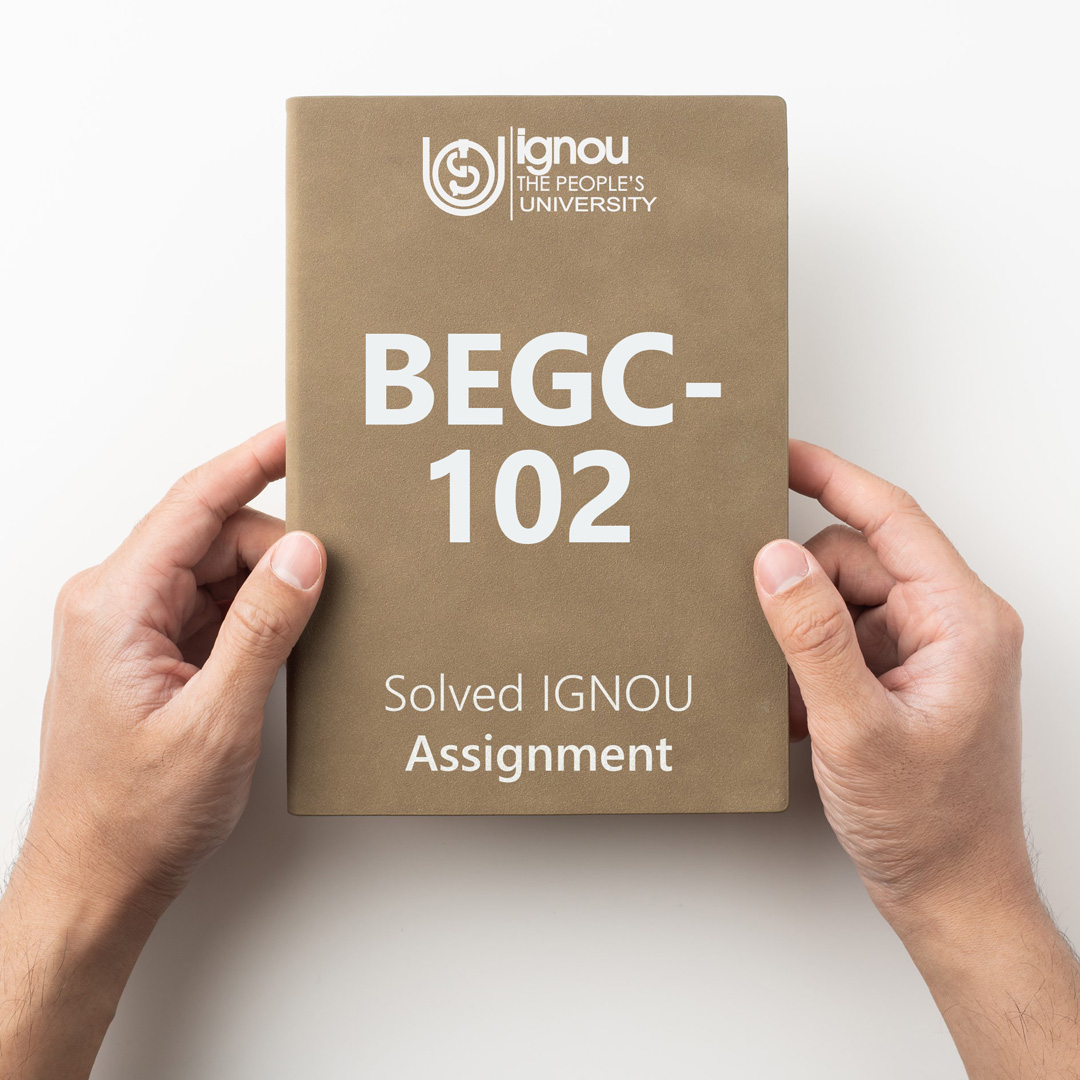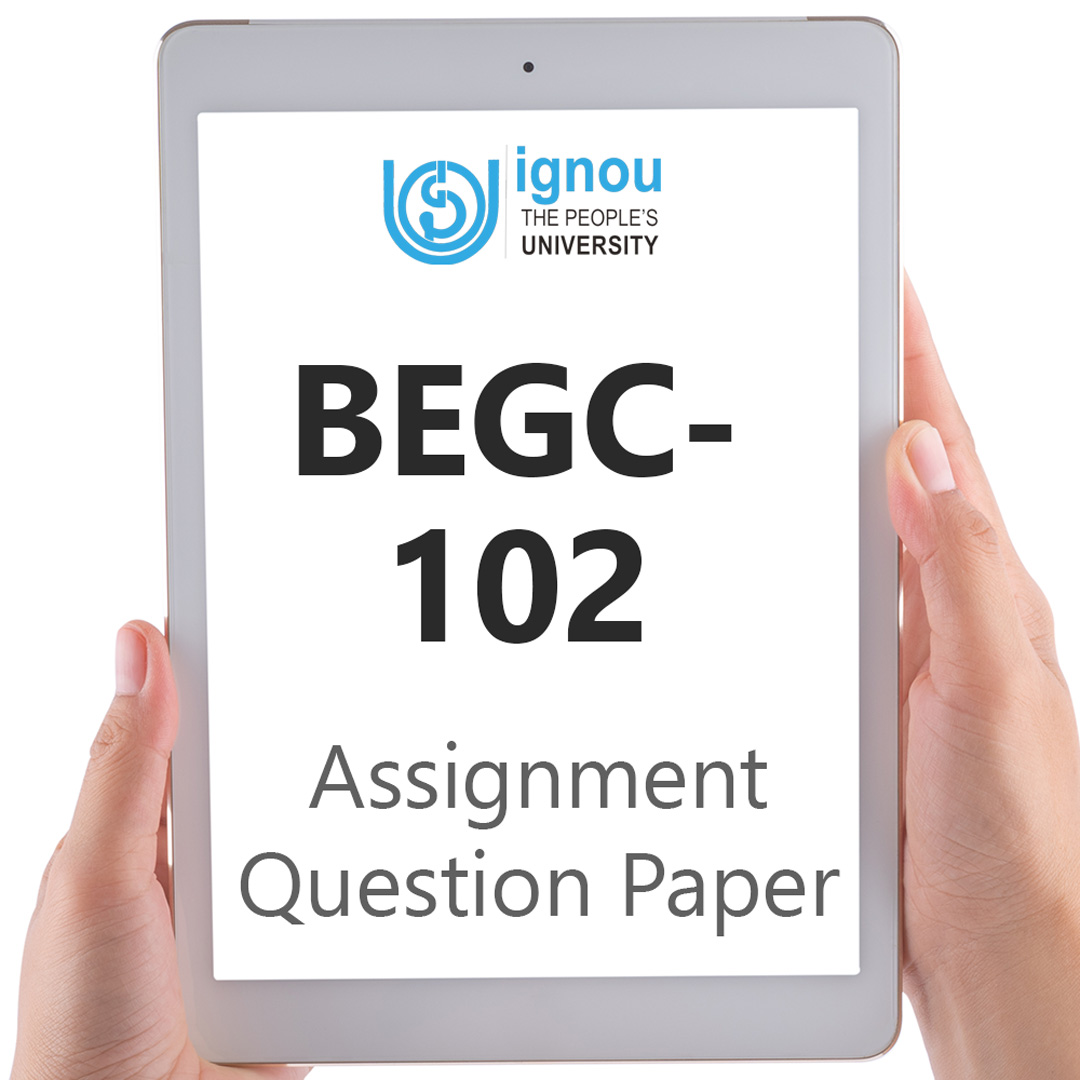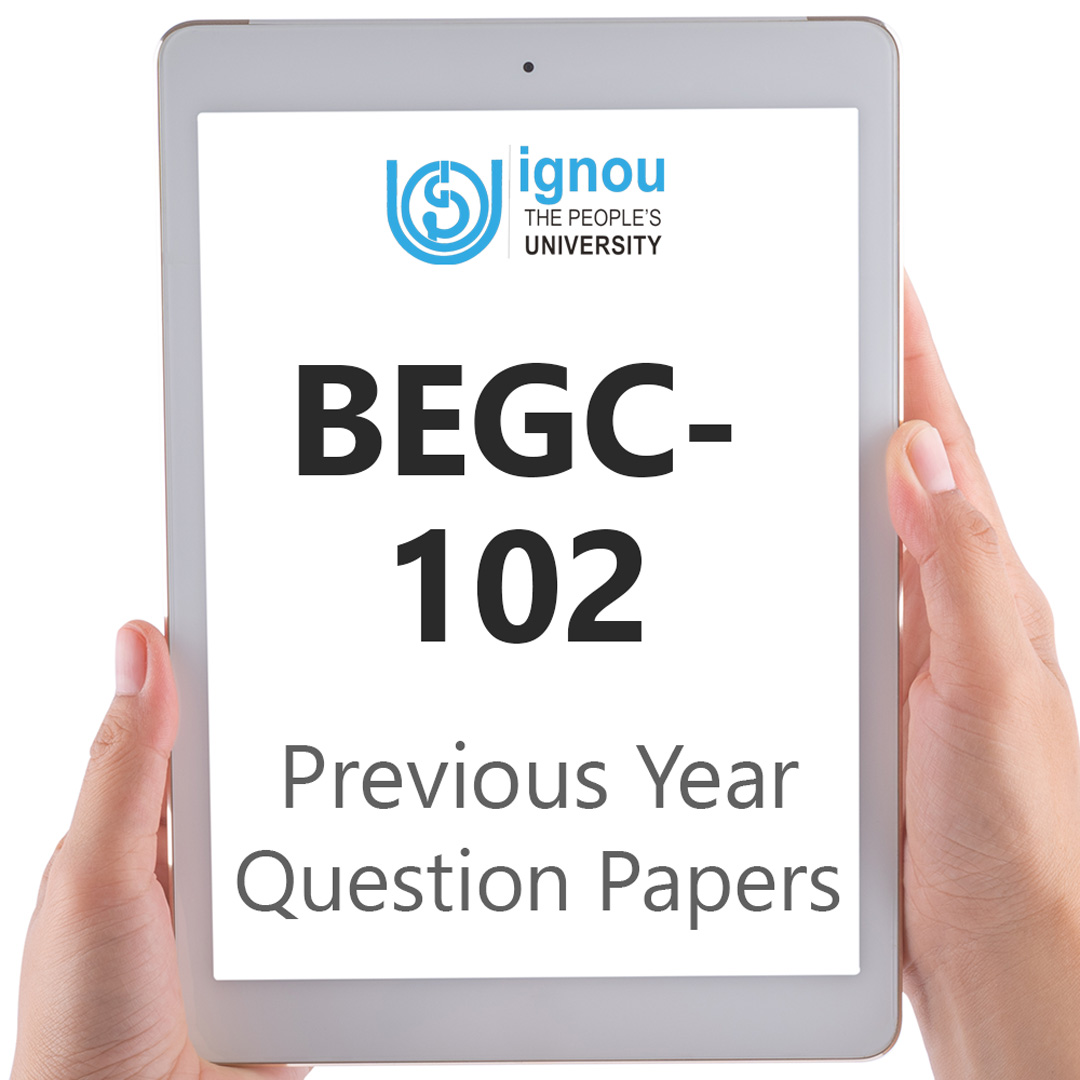If you are looking for BEGC-102 IGNOU Solved Assignment solution for the subject European Classical Literature, you have come to the right place. BEGC-102 solution on this page applies to 2022-23 session students studying in BAEGH courses of IGNOU.
BEGC-102 Solved Assignment Solution by Gyaniversity
Assignment Code: BEGC-102/July 2022-January 2023
Course Code: BEGC-102
Assignment Name: European Classical Literature
Year: 2022-2023
Verification Status: Verified by Professor
Max. Marks: 100
Answer all questions.
Section A
Q1. Write short notes in about 100 words each: 2 × 5 = 10
(i) Epic
Ans) According to Kline, the epic is one of the traditional genres of literature that "enlarges the human soul and portrays the grandeur and sublimity of life." Epic poetry is praised for its lofty themes and noble modes of expression. The form in which the material is communicated is equally as big as the content itself.
When describing the epic poem, Sri Aurobindo states, “…the song of the greatest flight that will reveal from the highest pinnacle and with the largest field of vision, the destiny of the human spirit and the presence and ways and purpose of the Divinity in man and the universe.”
In a world ruled by divinity or the supreme power, all epics follow a similar pattern of praising human achievement and the inherent dignity of Man even in his most challenging situations.
(ii) Unity of Action
Ans) The unity of action is what makes an epic. Unity of action is one of the three guidelines for dramatic construction set forth by the Greek philosopher and physicist Aristotle. The concept of unity of action states that there should only be one action and few supporting plots.
In both the Iliad and the Odyssey, Homer concentrates his narrative on a single event. Every action is seen as being directed, caused, or influenced by God in both of the Homeric epics. If you turn to the Ramayana and the Mahabharata, you will see that they share a common thread of action, namely the triumph of good over evil in the direction of the restoration of dharma.
Q2. Reference to the Context in about 100 words each: 2 X 5 = 10
(i) “… This proclamation I address to all:-
Thebans, if any knows the man by whom
Laius, son of Labadacus, was slain,
I summon him to make clean shrift to me.”
Ans) The above lines are taken from Oedipus Rex Play. Oedipus makes the following declaration, which further demonstrates his unwavering commitment to bringing about his own destruction: "I pray that the curse I have set on the murderer be transferred on to me, if the murderer comes into my home with my approval or consent." It demonstrates Oedipus's utter inability to believe that he may have been the killer as well as his piercing honesty in admitting that he would take any punishment for being associated with the murderer.
Creon denies conspiring to harm Oedipus as the scene begins. Oedipus is still upset about Creon accusing him of killing Laius. When Jocasta learns that the accusation was made by a prophet, she promptly rejects it. Oedipus becomes concerned that he might be the murderer after learning the circumstances behind Laius' passing. Jocasta, however, points out that Laius was killed by numerous men, not just one. However, Oedipus requests that the shepherd, who is the only living witness to the murder, be brought to him for interrogation.
(ii) “…What happened after that I cannot tell,
Nor how the end befell, for with a shriek
Burst on us Oedipus; all eyes were fixed
On Oedipus, as up and down he strode,
Nor could we mark her agony to the end”.
Ans) The above lines is taken from the play Oedipus Rex. Tiresias, the blind prophet, is ushered in by a young child. Tiresias simply responds that he knows the truth but wishes he did not. Oedipus asks him to divulge who killed Laius. Tiresias finally informs Oedipus that Oedipus himself is the curse after Oedipus accuses him invectively of the crime.
Oedipus is asked to calm down by the leader of the Chorus, but Tiresias simply teases him more by suggesting that the king doesn't even know who his parents are. Oedipus demands to know the truth about his parentage since this assertion both enrages and intrigues him. Given that Creon suggested that Tiresias arrive, Oedipus claims that he is attempting to have him overthrown. When Creon asks Oedipus to be reasonable, he responds by saying that he wishes to have Creon killed. The leader of the Chorus and Creon both make an effort to persuade Oedipus that he is making up fantasies, but Oedipus remains unwavering in his convictions and his rage.
Section B
Answer the following in about 350 words each: 4 X 20 = 80
Q1. Write a note on the different facets of war that is highlighted in the Iliad.
Ans) The different facets of war that is highlighted in the Iliad are as follows:
Eris, who throws a golden apple to the fairest of the three, marks the beginning of conflict and begins a theme that permeates the whole Iliad. Conflict amongst the goddesses is what starts the conflict. Achilles leaves the fight due of conflict. Conflict between numerous groups and people sharpens the poem's action. Finally, the poem comes to a close with the conflict's resolution.
The Iliad covers the facets of war as follows:
Heroic acts and recognition.
Suffering and feeling agony.
The ego struggle.
The catastrophic losses suffered both individually and collectively, such as losing a close friend or a son to a father.
After the fight, the women of the defeated army were sold into slavery, and their young sons were murdered to prevent them from growing up and rising in retaliation.
The battles' pointlessness and futility.
The entire destruction of a tranquil world.
The poem ignores the major reason why the Trojans and Greeks were at war, instead focusing on the final forty days of the struggle. The 24 books of The Iliad centre on Achilles, a Greek hero who killed Hector, his Trojan equivalent, and routed the Trojan army. Agamemnon and Achilles, the leader, and their clashing egos represent the central conflict in the Iliad's opening scene.
Even as Achilles tends to his ego and resentment, the fight continues. Thestor and several other Trojan fighters were brutally murdered by Patroclus in the fourteenth book of the Iliad, which appears to encourage war violence as a common occurrence. Homer does not judge the brutality of war or view the force and violence used by furious armies as dehumanising deeds. This is an acceptance of the unavoidable consequences of war, not a defence. Strangely, conflict makes men more violent and receptive to violence, bringing them closer.
When we hear of the Islamic State beheading hostages and the decapitation of enemy soldiers along the Line of Control between India and Pakistan, the Homeric vision keeps playing out before our eyes. A reprise of the World War II disaster occurred in Hiroshima and Nagasaki in 1945, approximately seven decades ago. More than 2.5 million people perished, the majority of them instantly, and the remainder from radiation-induced cancer and leukaemia a few years later.
Q2. Does Oedipus Rex resonate with us even today? Discuss.
Ans) Oedipus Rex, one of the most well-known Ancient Greek plays to have influenced modern society, has maintained its popularity because it focuses on the character's emotional journey and the challenging situations in which he finds himself. The play's unrestrained emotions personally resonate to a contemporary audience. The emotional appeal of the play, which makes Oedipus Rex so relatable and, consequently, well-known and popular among modern audiences, can be attributed to the distinctions between the current conception of a theatre and its representation through the prism of Ancient Greek culture. Because of the obviously morally repugnant position, the misery that King Oedipus through is easily comprehended by any reader. As a result, the myth is well perceived, and the moral problems of its title character are easily understood.
On a deeper level, the suspense that the conventional three-act form instils in readers helps to develop the excitement and give the lead character the emotional weight that is necessary for the audience to empathise with him or her. But what really makes the play exciting is the existence of a character who possesses good characteristics but also has a fundamental fault that will define his path to redemption and ultimately bring the storey to a tragic conclusion.
The recognised literary device, known as "hamartia" by Greek writers, is incredibly old but has endured since it aids in the development of a powerful and engaging character. It should be remembered that having a strong character does not necessarily mean that the reader will see them as a role model. By no means is King Oedipus a good person. While valiantly facing his approaching destiny, he makes decisions that were morally dubious even at the time the play was written, such killing a guy he hardly knew and who had no intention of hurting him (Sophocles). However, the character's shortcomings and errors serve to make him immensely believable and hence, very relatable. Although it is unlikely that any of today's readers have actually experienced the difficulty that King Oedipus must deal with, they have undoubtedly been in situations that like this one.
Q3. Does Euclio get integrated into society at the end of the Pot of Gold? Comment.
Ans) Pot of Gold's title immediately draws attention to the value placed on money, and as a result, Euclio's persona demands attention.
Euclio is a figure who is so preoccupied with keeping gold safe that he does not permit its circulation. The miser neither tries to accumulate more money nor spends it. He keeps his newly obtained status a secret out of concern about theft. It appears as though his ownership of the gold is a temporary state of stasis that will prevent any alteration. He seems to be someone who is obsessed with protecting his pot of gold. The treasure, according to the domestic deity Lar Familiaris, is wealth that has been passed down from one generation to the next. The household deity explains to the audience that despite having the pot of money, Euclio did not come from a wealthy social class. The Lar made the decision to withhold it from his forebears because they were not loyal to him.
The gold does not, therefore, represent riches that has ever increased the family's assets. It's still a frozen thing. The prologue and the sequence of happenings are presented in The Lar. By tinkering with the pot of gold, which represents the hidden fortune, he also develops the plot.
As a miser, Euclio is regarded as the protector of this fortune as well as a misanthrope who abstains from any form of socialisation involving money or relationships. He is, in essence, excluded from the socioeconomic conversation. As a miser, Euclio is the "agelast" more for his avarice in regard to the pot of gold than for being melancholy. Even when he is not required to spend anything, he refuses to appreciate any aspect of his life. If we apply this to the concept of social interaction, we can see how Plautus criticises those who are preoccupied with material concerns by using exaggeration and the comedic style. As a result, they are completely incapable of enjoying anything. Contrary to previous agelasts, Euclio has now achieved full social integration. Only after he gets rid of the jug of riches does this occur.
Q4. Examine the satire as a genre.
Ans) Satire is both a genre and literary method that exposes and mocks human nature. Although it is frequently focused on politics, it need not be. Irony, humour, and exaggeration are tools that writers in literature utilise to successfully produce satire. In order to ridicule, critique, or chastise people, satirists examine human behaviour and nature. This is done in a darkly funny manner. Satire, whether it is in a book, poem, or film, aims to make a point about the people or things it is based on. There may be something obvious or covert about this. Satire sometimes draws attention to glaring flaws in society or a person's character. Outsiders can see these things clearly, but people who have gotten accustomed to them may not notice them as much.
Satire is a literary genre in the strictest sense, but its broader definition—making fun of other people's flaws—is also present in the graphic and performing arts. Despite the fact that satire is typically meant to be humorous, its primary goal is criticism delivered with wit. Satire frequently contains a strong vein of irony or sarcasm and frequently employs double entendre, exaggeration, juxtaposition, contrast, and analogy. Though political commentary or social hypocrisy are two common targets of satire, excellent satire frequently targets human self-deception in one way or another. Satire can range from mild tolerance to venomous outrage in its tone. Satire, like any criticism, can be constructive and benevolent or driven by a desire to defame the target of the criticism. It is often didactic as a literary subgenre. It rarely seeks to examine universal human experience or hold up a mirror to existence as its main goal.
In an effort to teach, educate, and advance humanity, satirists set out to highlight the shortcomings of existing structures or modes of thought. Many satires use humour as a key element, although laughter is not the only goal of the satire. It's merely a means for the writer to convey their criticisms in a manner that readers will find engaging. A satirist hopes to provoke thought in their audience as well as amusement. Depending on the topic, the author may aim to persuade readers, expose fraud, or shed light on obscure social injustices.






